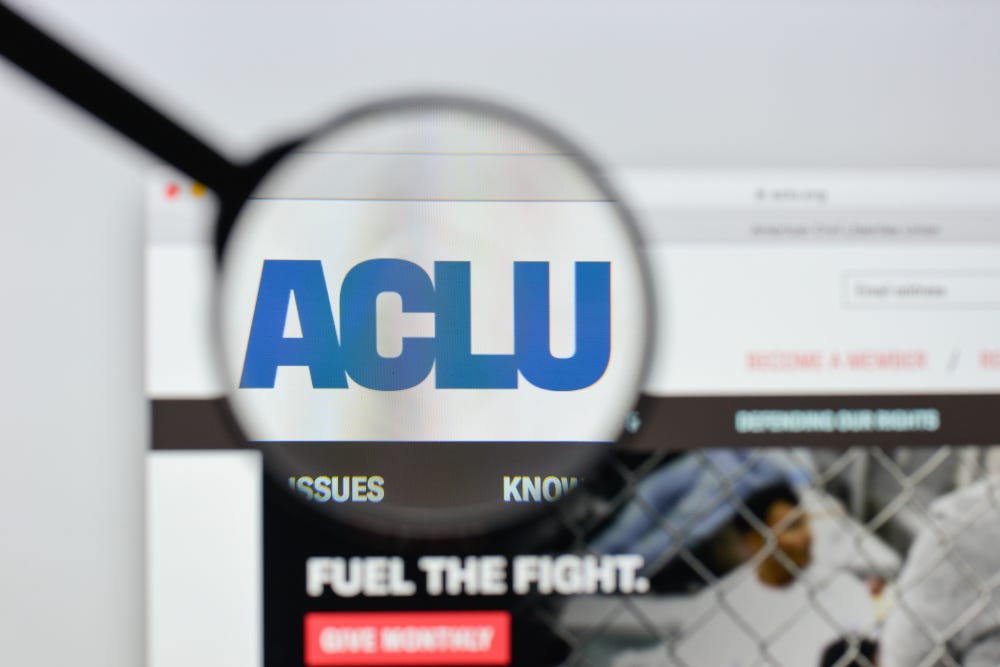E-Pluribus | November 18, 2022
The ACLU opposes government efforts to limit 'misinformation'; the trainwreck that is the search for the origin of COVID; and Jon Stewart on censorship and the nature of comedy.
A round-up of the latest and best writing and musings on the rise of illiberalism in the public discourse:
Jacob Sullum: The ACLU Says California's Ban on COVID-19 'Misinformation' From Doctors Is Gratuitous and Unconstitutional
At Pluribus, we have frequently called out the ACLU for abandoning its roots, but at least two California chapters of the group haven’t completely lost their way. Reason’s Jacob Sullum reports that the Northern and Southern California ACLU offices are opposing California’s overreach on medical “misinformation” regarding Covid that they say clearly infringes on the First Amendment rights of medical professionals.
The ACLU notes that legislators also expressed concern about "physicians' public dialogue regarding COVID-19," such as messages on social media or interviews with the press. The NCLA's complaint cites threats from supporters of A.B. 2098 who implied that the law could be used to punish doctors for promoting their own research or publicly expressing opinions about COVID-19 controversies. But public commentary is "beyond AB 2098's final scope," the ACLU brief says, because it was obvious "the State cannot regulate such speech," and the same goes for private advice to patients that falls short of "unprofessional conduct" as previously defined.
Even if some applications of the new law passed constitutional muster, the ACLU argues, its vagueness would violate the First Amendment by encouraging self-censorship. "Prophylactic, content-based rules like AB 2098 are suspect in part because their 'very existence' threatens to chill speech," the brief says, and that problem is compounded when the rules are ambiguous.
The LJC's motion for a preliminary injunction notes the difficulty that physicians will have in figuring out what A.B. 2098 requires. The law defines "misinformation" as "false information that is contradicted by contemporary scientific consensus contrary to the standard of care." As written, the LJC notes, "the definition is senseless, as it says that the covered information is contradicted by a consensus that is itself contrary to the standard of care." That puzzling language, the motion says, "suffices to make the statute void for vagueness, for it is incomprehensible."
Let's assume legislators meant that "misinformation," rather than the "scientific consensus," is "contrary to the standard of care," which is how Gov. Gavin Newsom seems to read the law. Even then, "hopeless ambiguities remain," the LJC says.
Read the whole thing.
Nicholas Wade: Home Truths on Where Covid Came From
In 2020, questioning the official line on the origin of Covid-19 was a great way to be branded a conspiracy theorist, a racist, or both. Two years later, there’s been an about face as a 2022 ProPublica-Vanity Fair investigation and a recent opinion piece from the Washington Post editorial board demonstrate. Nicholas Wade at City Journal urges the new Republican House to take note and investigate.
Journals are not the only scientific institution to have fallen down in the pursuit of the virus’s origin. The National Academy of Sciences is chartered to give advice to the government. Under the leadership of its current president, Marcia McNutt, it has done nothing except issue a fatuous plea for discussants not to call each other rude names. True, the academy can address only questions the government asks of it, but it is well practiced at eliciting the questions it wishes to answer. The White House’s Office of Science and Technology Policy has been equally out to lunch.
As for the mainstream media, what can one say? The golden rule for science editors in reporting an open issue like the virus’s origin is not complicated. Cover all sides fully and fairly, and you won’t look foolish if the story turns out in a way you didn’t expect. The inquiry committee will want to ask science editors from the major media why they found it so hard to follow this simple rule.
The Covid-19 epidemic first emerged in Wuhan, almost on the doorstep of the Wuhan Institute of Virology, where SARS-like viruses were being engineered for greater infectivity. That the two things could be connected is a possibility as plain as day. Yet for two years, people of influence gulled most Americans into believing the opposite of what common sense suggested. In whose interest was this colossal misdirection? Of course, in China’s. The congressional committee should look into China’s ability to influence the beliefs and actions of America’s elites. . .
Read it all here.
The Late Show with Stephen Colbert: Jon Stewart On Dave Chappelle, Kyrie Irving, And Kanye West
And now for something completely different. No, not Monty Python, but we rarely link to YouTube videos, much less a Stephen Colbert-Jon Stewart video. But Stewart had some interesting observations in the wake of Dave Chappelle’s Saturday Night Live appearance that are worth a listen. (The following transcript of some excerpts has been lightly edited for clarity.)
Everybody obviously calls me and says, Did you see Dave [Chappelle] on SNL? And I'm like, yes, we're very good friends. I always watch and send nice texts. [They say,] “He normalized antisemitism with the monologue.” And I'm like, I don't know if you've been on comment sections on most news articles, but, uh, it's pretty [bleeped] normal. As you know, it's, it's incredibly normal. But the one thing I will say is I don't believe that censorship and penalties are the way to end antisemitism or to not gain understanding. I don't believe in that. And I think it's the wrong way for us to approach it. Kyrie Irving, they suspended him from playing basketball. If you wanna punish this man, send him to the Knicks.
[ . . . ]
[I]n all seriousness, you know, penalizing somebody for having a thought I don't think is the way to change their minds or gain understanding. This is a grown-ass man and the idea that you would say to him, we're gonna put you in a timeout. You have to sit in the corner and stare at the wall until you no longer believe that the Jews control the international banking system. Like, we have to get past this in the country. The ability to… look, people think this, people think Jews control Hollywood. People think Jews control the banks. And to pretend that they don't and to not deal with it in a straightforward manner, we will never gain any kind of understanding with each other.
[ . . . ]
Comedy is reductive. And I think part of what it is, is we play with tropes because everyone has prejudice in their lives and in the way that they view things. And comics rely on those prejudices as a shorthand for our material. Even the wokest of comics plays with tropes to a certain extent. But my point is, the most interesting thing to come out of this in my mind, was something Kanye said on his, uh, on his tour that he was doing after he said that and then he got interviewed by five, you know, different people, uh, because the media model is arson in conflict. Um, he said something fascinating in my mind. He said, “Hurt people hurt people.” And if the point of all this is then to heal people, the only way to heal the wound is to open it up and cleanse it and that sting, that hurts[.]
Watch it all.
Around Twitter
Glenn Greenwald makes the point that even believable claims about terrible people should be verified before being reported or amplified if credibility is to be maintained:
Trans rights activist Chase Strangio has a strange reaction to the uptick in stories about the issues surrounding transgender youth, and Andrew Sullivan has some questions:
And finally, a nomination for Understatement of the Year is in order for the New York Times for its use of “complicate” in this Qatar-FIFA update:









